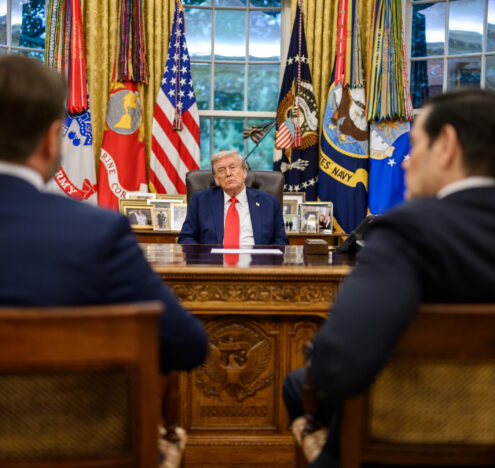The United States announced a fifth round of sanctions against Israeli settlers, settler organizations, and their enablers on July 11, indicating a growing recognition in Western capitals that the current Israeli government is fixated on annexing the West Bank. This strategy has only expanded since the start of the Gaza war, severely threatening any future two-state solution realizing a Palestinian state alongside Israel. World leaders are doing the minimum to meet this challenge, risking any sustainable peace and an expanded Israel-Palestine conflict as a result — outcomes that deserve rejection on moral, legal, and strategic grounds.
Yet while actions like sanctions — similarly introduced by the European Union on July 15 — are welcome with respect to checking the Israeli settler movement, they come far too late in the game. In the shadow of Israel’s illegal 76-year occupation of Palestinian lands, Tel Aviv’s actions since current Prime Minister Benjamin Netanyahu’s far-right government took power in January 2023 epitomize the accelerated speed of the settler movement’s efforts to claim the West Bank.
Far-right Finance Minister, Defense Ministry official, and settler leader Bezalel Smotrich, who was transferred substantial powers governing the occupied West Bank from the military to civilian rule, continues to use his position to establish de facto annexation over increasingly large portions of the territory. Israel’s appropriation of 2,965 acres of land in the Jordan Valley on June 25 epitomizes this reality.
One day later, Tel Aviv announced 5,295 new housing units across multiple illegal settlements in the West Bank, legalizing several settlement outposts in the process. Similarly, Israel legalized five West Bank settlements on June 28 that it previously considered illegal. According to Smotrich, the move responds to Spain, Norway, Ireland, and Slovenia’s unilateral recognition of Palestine as an independent state just weeks prior.
Further Complicating a Palestinian State
The decision constitutes a major policy within Israel’s broader far-right political platform, which Netanyahu and his governing partners organized. That platform reads, “The Jewish people have an exclusive and inalienable right over all areas of the Land of Israel. The government will promote and develop the settlement of all parts of the Land of Israel — in the Galilee, the Negev, the Golan, and Judea and Samaria,” also known as the West Bank.
The current Israeli government is enacting this policy to the fullest, indicating its rejection of any future Palestinian state or peace talks with Palestinian leaders. As Netanyahu has said for years, including this year: there will be no Palestinian state, defining any such move as a “reward for terror.” Smotrich has gone so far as to call the eradication of Palestinian towns and reclamation of the land as his “life’s work.”
Even a casual observer of the current situation in the occupied West Bank under the current Israeli government can understand the natural progression underway.
Even a casual observer of the current situation in the occupied West Bank under the current Israeli government can understand the natural progression underway. Increasingly embedding Israeli citizens in illegal communities across land designated for a future Palestinian state further complicates that state’s realization. It simultaneously introduces opportunities for radical elements on both sides of the conflict to fuel their narratives — namely that their rival ethnic group cannot possibly exist on the same land or adjacent.
Per international law, it is illegal to populate occupied land or forcibly displace the local indigenous population of that land — rules Israel regularly disregards even when at times violating its domestic laws. Western leaders claim to reject such actions while doing little to address the problem, as the sanctions decision attests. This implicit support for Tel Aviv is politically convenient because Israel still enjoys significant support among Western populaces — although this is rapidly changing due to its actions in Gaza.
Wrench in US Plans
Yet the politically convenient act of kicking the settlement issue down the road is a real detriment to the foreign policy objectives of these countries — particularly the US. The Biden administration has pushed a regional integration strategy highlighted by an eventual Israel-Saudi Arabia normalization pact that would, in Washington’s eyes, produce autocratic stability to counter Iran and its so-called Axis of Resistance. This would allow the US to shift focus to other critical security and foreign policy concerns — namely China and the Asia Pacific.
The war in Gaza threw a massive wrench in those plans, although US officials claim to continue working towards the crown achievement of a Saudi-Israeli deal. Such a move is unrealistic amid that war and Israel’s broader actions in the occupied Palestinian territories.
Indeed, Arab leaders continue to watch with dismay as Tel Aviv ramps up its illegal actions in the West Bank, bombs Gaza back to “the Stone Age,” and threatens to do the same to Lebanon and any other Arab states or actors daring enough to challenge it. In no realistic scenario can Saudi Crown Prince Mohammed bin Salman appear shaking hands with Netanyahu atop the graves and lost lands of Palestinians as the region’s people call for unquestioned and unprecedented Palestinian solidarity.
Inhibiting US Foreign Policy Objectives
Thus, the issue of settlements is yet another spoiler within the broader Israel-Palestine conflict directly inhibiting US foreign policy objectives regionally and globally. Sanctions against settler and far-right groups do nothing to alleviate this reality, especially when enforcement is incredibly lax and not attached to a broader strategy, as both Arab leaders and populaces and Israeli leaders understand. Simply put, a slap on the wrist will not stop the arsonists from burning everything down once they have already lit the fire.
Rather, the US must directly check the arsonists running Israel’s government before it is too late, given their unique influence over Tel Aviv. Doing so is not only a net positive for innocent Palestinians demanding justice and equal rights — it supports broader US interests that must be focused on building its soft power globally while right-sizing its actions and policies to match today’s biggest challenges.
Washington cannot hope to achieve its foreign policy goals in Ukraine or the Asia Pacific if most of the world views it as holding double standards by irresponsibly enabling the worst of human brutality — a scenario that unfortunately defines global perceptions of America today.




















